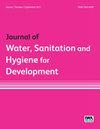尼日利亚塔拉巴州贾林戈地方政府区(LGA)境内流离失所者暴露于泌尿生殖道血吸虫病和土壤传播的蠕虫病,导致河水使用、个人卫生和环境卫生不足
IF 1.4
4区 环境科学与生态学
Q3 WATER RESOURCES
Journal of Water Sanitation and Hygiene for Development
Pub Date : 2022-10-21
DOI:10.2166/washdev.2022.089
引用次数: 0
摘要
确定了水和土壤传播的蠕虫病与Jalingo地方政府区(LGA)境内流离失所者的社会人口状况和风险因素的关系。还对感染者的营养状况进行了研究。尿液过滤和Kato-Katz技术分别用于检查尿液和粪便样本。泌尿生殖道血吸虫病感染的中度水平为52(17.6%),而蛔虫和钩虫感染的低水平分别为48(16.3%)和8(2.7%)。Jauro Gbadi营地和41至50岁年龄组的钩虫感染率最高,分别为8人(8.2%)(χ2=16.70;p=0.000)和2人(11.7%)(σ2=17.59,p=0.003)。农民明显感染了泌尿生殖道血吸虫病(20.1%)(χ2=14.03;p=0.043)。在河流中捕鱼使更多的人暴露于泌尿生殖道血吸虫,调整后的比值比(aOR)=8.60(95%CI:0.86–85.52;p=0.046)。缺乏卫生措施使更多“吃东西前不洗手”的人暴露在具有aOR的土壤传播蠕虫病中=4.13(95%可信区间:0.77–21.99;p=0.045)。在卫生条件下,“不使用坑式厕所,而是使用灌木进行脱脂”的个人暴露于土壤传播的蠕虫病,aOR=2.14(95%置信区间:1.30–3.52;p=0.002)。农民感染了泌尿生殖道血吸虫病。Jauro Gbadi营地的人和11至50岁年龄组的人都感染了钩虫。河水的使用、不适当的个人卫生和环境卫生使个人受到感染。本文章由计算机程序翻译,如有差异,请以英文原文为准。
Use of rivers' water, inadequate hygiene, and sanitation as exposure of internally displaced persons (IDPs) to urogenital schistosomiasis and soil-transmitted helminthiasis in Jalingo Local Government Area (LGA), Taraba State, Nigeria
Water- and soil-transmitted helminthiasis in relation to socio-demographic status and risk factors of internally displaced persons in Jalingo Local Government Area (LGA) were determined. The nutritional status was also studied among infected individuals. Urine filtration and Kato-Katz techniques were used to examine urine and faecal samples, respectively. Urogenital schistosomiasis infection was found at a moderate level of 52 (17.6%), whereas a low level of ascariasis and hookworm infections were found at 48 (16.3%) and 8 (2.7%), respectively. People in Jauro Gbadi camp and in the age group between 41 and 50 years had significantly the highest infection with hookworm, 8 (8.2%) (χ2 = 16.70; p = 0.000) and 2 (11.7%)(χ2 = 17.59, p = 0.003), respectively. Farmers were significantly infected with urogenital schistosomiasis (20.1%) (χ2 = 14.03; p = 0.043). Fishing in rivers exposed more individuals to urogenital schistosomiasis with an adjusted odds ratio (aOR) = 8.60 (95% CI: 0.86–85.52; p = 0.046). The lack of hygienic measures exposed more individuals who ‘don't wash their hands before eating’ to soil-transmitted helminthiasis with an aOR = 4.13 (95% CI: 0.77–21.99; p = 0.045). In sanitation, individuals who ‘don't use pit latrines and do use the bush for defaecating’ were exposed to soil-transmitted helminthiasis with an aOR = 2.14 (95% CI: 1.30–3.52; p = 0.002). Farmers were infected with urogenital schistosomiasis. People in the Jauro Gbadi camp and individuals between the age groups of 11 and 50 years had hookworm infection. Use of river water, inappropriate hygiene, and sanitation exposed individuals to infection.
求助全文
通过发布文献求助,成功后即可免费获取论文全文。
去求助
来源期刊

Journal of Water Sanitation and Hygiene for Development
WATER RESOURCES-
CiteScore
3.10
自引率
11.80%
发文量
58
审稿时长
16 weeks
期刊介绍:
The Journal of Water, Sanitation and Hygiene for Development is a peer-reviewed journal devoted to the dissemination of high-quality information on the science, policy and practice of drinking-water supply, sanitation and hygiene at local, national and international levels.
 求助内容:
求助内容: 应助结果提醒方式:
应助结果提醒方式:


